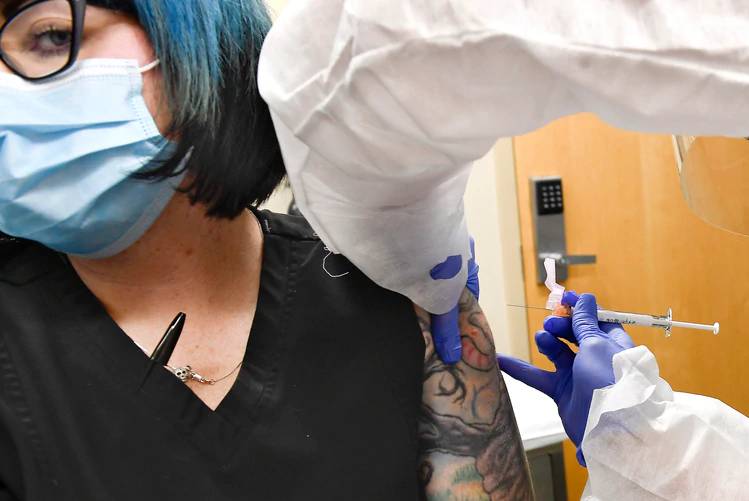When the leaders of the world’s industrialized nations meet next week in Cornwall, British Prime Minister Boris Johnson will ask them to commit to “vaccinate the entire world against coronavirus by the end of 2022,” according to a statement Saturday.
"Vaccinating the world by the end of next year would be the single greatest feat in medical history," Johnson said in a statement. "I’m calling on my fellow G-7 leaders to join us to end this terrible pandemic and pledge we will never allow the devastation wreaked by coronavirus to happen again."
He may run into some pushback from his own country.
New cases of COVID-19, the disease caused by the coronavirus, have dropped dramatically since the United Kingdom began its vaccination campaign. Now nearly 68 million people have received at least one shot and nearly 27 million are fully vaccinated, according to Johns Hopkins Coronavirus Resource Center. That’s 40% of the population.
But cases of the Delta variant are on the rise and that could threaten the nation’s progress. As Britain opens up, Health Secretary Matt Hancock told Reuters, a rise in cases is expected. The vaccine, he said, has broken the link between rising cases and rising deaths.
“But it hasn't been completely severed yet, and that's one of the things that we're watching very carefully," he added.
In China’s Guangzhou city, a port city of more than 13 million people, new restrictions took effect Saturday because of a rise in COVID-19 cases that began in late May.
Of the 24 new cases of COVID-19 reported in China on Saturday, 11 were transmitted in Guangzhou province, where the city is located.
Authorities had imposed restrictions earlier in the week but sought additional limits on business and social activities. Authorities closed about a dozen subway stops, and the city’s Nansha district ordered restaurants to stop dine-in services and public venues, such as gyms, to temporarily close.
Officials in the districts of Nansha, Huadu and Conghua ordered all residents and any individuals who have traveled through their regions to be tested for COVID-19, the disease caused by the coronavirus, Reuters reported.
As Afghanistan attempts to beat back a surge in COVID-19 cases, it has received the news that the 3 million doses of vaccines it was expecting from the World Health Organization in April will not arrive until August, according to the Associated Press.
Afghan health ministry spokesperson Ghulam Dastagir Nazari told AP that he has approached several embassies for help but has not received any vaccines. “We are in the middle of a crisis,” he said.
The war-torn country reported nearly 7,500 new cases in the week ending Saturday, a record, according to Johns Hopkins, and 187 deaths, also a record. The official figures are no doubt an undercount because they include only those in hospitals, while most people who become sick stay home and die there, the AP said.
Afghan health officials are blaming the Delta variant, first discovered in India, for its soaring infection rate. Travel to India is unrestricted and many students and those seeking medical care go there, according to the AP.
While the government has tried to enforce mask wearing and social distancing, most Afghans resist.
"Our people believe it is fake, especially in the countryside," Dr. Zalmai Rishteen, administrator of the Afghan-Japan Hospital, the only hospital dedicated to COVID-19 patients, told the AP. "Or they are religious and believe God will save them."
About 626,000 Afghans have received one shot of a coronavirus vaccine, with about 145,000 fully vaccinated, according to Johns Hopkins.
On Saturday, India’s health ministry reported 120,529 new COVID-19 cases in the previous 24 hours period, the lowest daily count of new infections in 58 days. More than 3,000 deaths were also recorded.
Johns Hopkins reported Saturday more than 172 million global COVID infections. The U.S. has the most cases with 33.3 million, followed by India with 28.7 million and Brazil with nearly 17 million.
(VOA)

